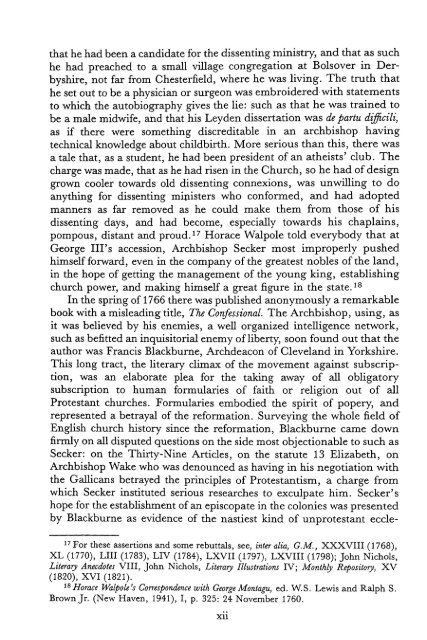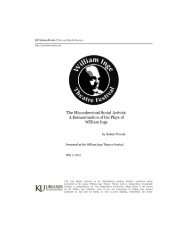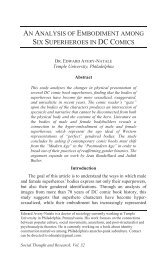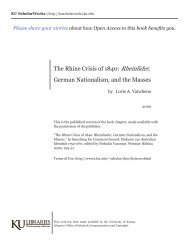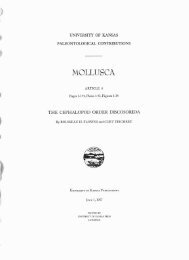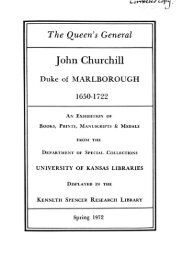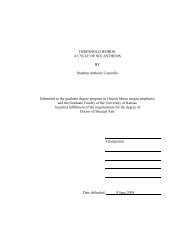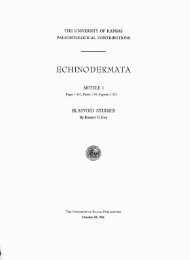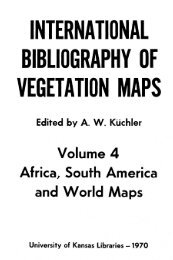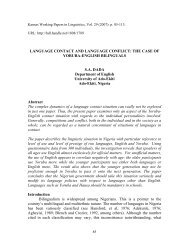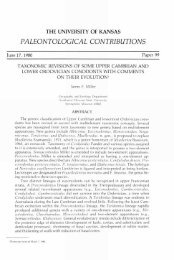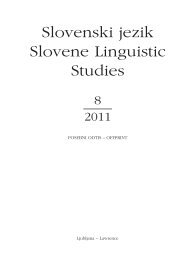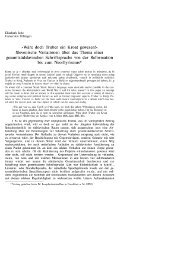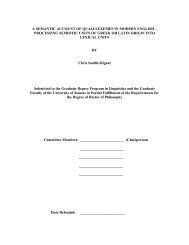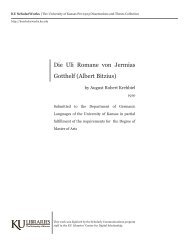Archbishop of Canterbury - KU ScholarWorks - The University of ...
Archbishop of Canterbury - KU ScholarWorks - The University of ...
Archbishop of Canterbury - KU ScholarWorks - The University of ...
Create successful ePaper yourself
Turn your PDF publications into a flip-book with our unique Google optimized e-Paper software.
that he had been a candidate for the dissenting ministry, and that as such<br />
he had preached to a small village congregation at Bolsover in Derbyshire,<br />
not far from Chesterfield, where he was living. <strong>The</strong> truth that<br />
he set out to be a physician or surgeon was embroidered with statements<br />
to which the autobiography gives the lie: such as that he was trained to<br />
be a male midwife, and that his Leyden dissertation was de partu difficili,<br />
as if there were something discreditable in an archbishop having<br />
technical knowledge about childbirth. More serious than this, there was<br />
a tale that, as a student, he had been president <strong>of</strong> an atheists' club. <strong>The</strong><br />
charge was made, that as he had risen in the Church, so he had <strong>of</strong> design<br />
grown cooler towards old dissenting connexions, was unwilling to do<br />
anything for dissenting ministers who conformed, and had adopted<br />
manners as far removed as he could make them from those <strong>of</strong> his<br />
dissenting days, and had become, especially towards his chaplains,<br />
pompous, distant and proud. 17 Horace Walpole told everybody that at<br />
George Ill's accession, <strong>Archbishop</strong> Seeker most improperly pushed<br />
himself forward, even in the company <strong>of</strong> the greatest nobles <strong>of</strong> the land,<br />
in the hope <strong>of</strong> getting the management <strong>of</strong> the young king, establishing<br />
church power, and making himself a great figure in the state. 18<br />
In the spring <strong>of</strong> 1766 there was published anonymously a remarkable<br />
book with a misleading title, <strong>The</strong> Confessional. <strong>The</strong> <strong>Archbishop</strong>, using, as<br />
it was believed by his enemies, a well organized intelligence network,<br />
such as befitted an inquisitorial enemy <strong>of</strong> liberty, soon found out that the<br />
author was Francis Blackburne, Archdeacon <strong>of</strong> Cleveland in Yorkshire.<br />
This long tract, the literary climax <strong>of</strong> the movement against subscription,<br />
was an elaborate plea for the taking away <strong>of</strong> all obligatory<br />
subscription to human formularies <strong>of</strong> faith or religion out <strong>of</strong> all<br />
Protestant churches. Formularies embodied the spirit <strong>of</strong> popery, and<br />
represented a betrayal <strong>of</strong> the reformation. Surveying the whole field <strong>of</strong><br />
English church history since the reformation, Blackburne came down<br />
firmly on all disputed questions on the side most objectionable to such as<br />
Seeker: on the Thirty-Nine Articles, on the statute 13 Elizabeth, on<br />
<strong>Archbishop</strong> Wake who was denounced as having in his negotiation with<br />
the Gallicans betrayed the principles <strong>of</strong> Protestantism, a charge from<br />
which Seeker instituted serious researches to exculpate him. Seeker's<br />
hope for the establishment <strong>of</strong> an episcopate in the colonies was presented<br />
by Blackburne as evidence <strong>of</strong> the nastiest kind <strong>of</strong> unprotestant eccle-<br />
1 7 For these assertions and some rebuttals, see, inter alia, G.M., XXXVIII (1768),<br />
XL (1770), LIII (1783), LIV (1784), LXVII (1797), LXVIII (1798); John Nichols,<br />
Literary Anecdotes VIII, John Nichols, Literary Illustrations IV; Monthly Repository, XV<br />
(1820), XVI (1821).<br />
1 8 Horace Walpole }s Correspondence with George Montagu, ed. W.S. Lewis and Ralph S.<br />
Brown Jr. (New Haven, 1941), I, p. 325: 24 November 1760.<br />
xii


